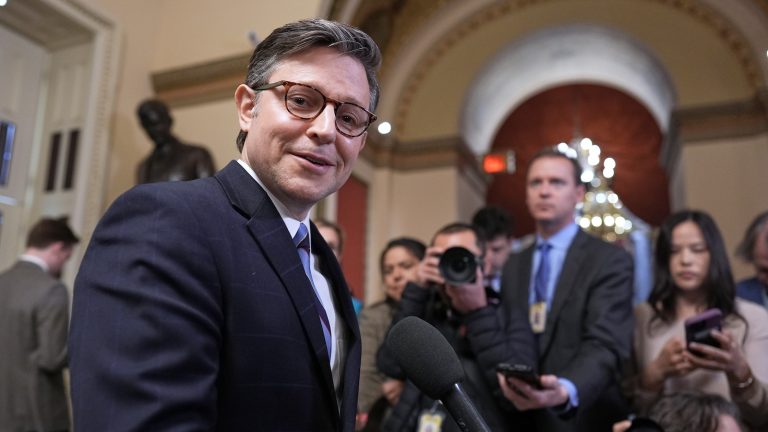In a vote on Thursday, the House of Representatives passed the Safeguard American Voter Eligibility (SAVE) Act, a bill Republicans have celebrated but that has drawn the ire of voting rights groups and most congressional Democrats.
The bill passed with 220 votes in favor and 208 opposed. Four Democrats joined the Republican majority in the House to advance the bill.
It now heads to the Senate, which did not act after the House passed the bill last July — allowing it to expire at the end of the 118th Congress. Republicans will need Democratic support to overcome a 60-vote threshold to be able to pass the bill in the Senate.
The measure would require states to obtain in-person “documentary” proof of citizenship before registering a person to vote for a federal election. The measure also would require states to remove noncitizens from existing voter rolls.
Noncitizens are already prohibited from voting in federal and state elections, though some cities and localities allow noncitizens to vote in some local elections, and voter roll audits leading up to the 2024 elections found rare instances of noncitizen voting.
Senate Minority Leader Chuck Schumer, D-N.Y., posted Thursday that the bill is “dead on arrival” in the Senate/
“The Republicans’ SAVE Act reads more like a how-to guide for voter suppression. It goes against the very foundations of our democracy,” he added. “Mark my words: This will not pass the Senate.”
Supporters of the bill have argued it will strengthen voting laws and confidence in elections and that it gives states flexibility to figure out how to allow people to register to vote if they have an issue or discrepancy with the documents.
“Despite the ridiculous attacks and purposeful misinformation spread about the bill, I am pleased to see that the House of Representatives once again passed the SAVE Act on a bipartisan basis to ensure only U.S. citizens vote in federal elections,” Rep. Chip Roy, R-Texas, the author of the legislation, said in a statement on Thursday. “In order to preserve this republic, we must uphold what it means to be able to vote in a U.S. election.”
“You have to prove your identity because only U.S. citizens should vote and decide U.S. elections. It’s already in federal law, but there’s no mechanism currently to ensure that that law is always followed, and this measure, the SAVE act, will help make sure that it’s true,” House Speaker Mike Johnson, R-La., told reporters after the bill passed.

Speaker of the House Mike Johnson talks to reporters just after House Republicans approved their budget framework that is central to President Donald Trump’s agenda, at the Capitol in Washington, April 10, 2025.
J. Scott Applewhite/AP
Opponents of the bill, including many voting rights organizations, have argued that the bill, if it becomes law, could disenfranchise voters who are citizens but do not have the eligible documents and that it will make it far tougher to register to vote.
Some opponents of the SAVE Act have also raised concerns over challenges married women could face if their current last names do not match their birth certificates, if they have to use one as a qualifying document. Supporters have countered that states will have the flexibility to figure out solutions for those affected.
When We All Vote, a voting advocacy group founded by former first lady Michelle Obama, criticized the bill in a statement on Thursday — calling it “another attempt to silence voters and decrease participation in our elections” and predicting that its passage “would effectively end online, automatic and mail-in voter registration.”
Michael Waldman, president of the nonpartisan Brennan Center for Justice at the New York University School of Law, called on the Senate to reject the bill.
“The House has just passed one of the worst pieces of voting legislation in American history. The Senate must stop it. The SAVE Act would put voting out of reach for millions of American citizens. It should not become law,” Waldman wrote in a statement on Thursday.
The Brennan Center said over 21 million voters would not have the required documents easily accessible.
President Donald Trump has voiced continued support for the measure, including during his 2024 presidential campaign. Republicans had attempted to tuck the measure into a continuing resolution last fall, but Senate Democrats blocked it from advancing further.
The four Democrats who supported the bill’s passage on Thursday are Reps. Jared Golden, D-Maine, Marie Gluesenkamp Perez, D-Wash., Henry Cuellar, D-Texas, and Ed Case, D-Hawaii.
Glusenkamp Perez wrote in a statement on Thursday, “I do not support noncitizens voting in American elections. … Voting in our nation’s elections is a sacred right belonging only to American citizens, and my vote for the SAVE Act reflects that principle.”
But she added that she believes the bill “stands no chance of passage in the Senate due to the filibuster, as well as several deeply flawed provisions.”
Golden, however, said he was “confident” that the bill provides several accommodations to address concerns regarding difficulties in registering to vote following name changes and argued the legislation is necessary to keep elections secure.
“The right to vote in American elections should be exclusive to American citizens. Requiring people to prove citizenship when registering to vote is a simple way to ensure that’s happening across the country,” Golden said.
ABC News’ Joanne Haner contributed to this report.



